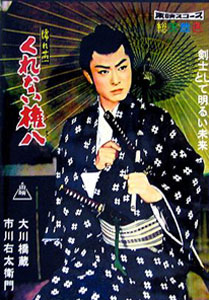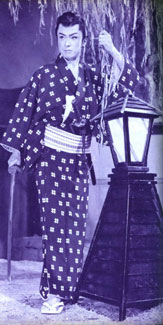 In the 1950s & '60s, Hashizo Okawa tended to star in samurai films aimed at the youth market, but with sufficient quality of storytelling & personal charm as an actor that his films are easy viewing for adult interest, too. In the 1950s & '60s, Hashizo Okawa tended to star in samurai films aimed at the youth market, but with sufficient quality of storytelling & personal charm as an actor that his films are easy viewing for adult interest, too.
It was rare, however, that he appeared in authentically cruel or dark samurai films. He did so occasionally, but for the most part his films were "family safe." And the color Drenched-Swallow Gonpachi (Nuretsubame Kurenai Gonpachi, Toei, 1958) is not an exception to that rule.
It's a enjoyable period film with enough dramatic content, & elegantly choreographed swordplay, to serve its function perfectly for young an old alike, good of kind, the kind being conventional chambara "product" with no intent of art.
Gonpachi's duel with an old fencing master, Munakata Tesshin, was witnessed by the Lord of Himeji. The duel was declared a draw, & Gonpachi offered no complaint about the decision. But the old instructor knew he had actually been defeated.
Munakata Tesshin longed for the wandering swordsman to stay & become affiliated with his sword college, for "a young man like that invigorates older men."
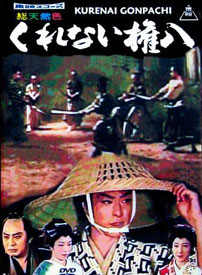 Some of the old instructor's students also realized their master had been defeated by a secret style. Feeling their school had lost face, they follow after Gonpachi with intent to kill. Some of the old instructor's students also realized their master had been defeated by a secret style. Feeling their school had lost face, they follow after Gonpachi with intent to kill.
Five of Munakata's pupils waylay the young man on a bridge by night. The leader of this pack is Ihada Tatsuhoshin. The one weakness of the plot is that these students are as unreasonable as would be the students of a second-rate sensei.
It's a little hard to believe the whole story hinges on Munakata having had this many students who so quickly imagine a reason for a grudge, & believe their master's defeat is more diminishing than their own behavior at odds with Munakata's high morality.
The fault, however, is in the writing, not the performances; the script is so conventional, the rationale the duel so commonplace in swordplay literature, that nobody was careful enough to be certain it fit well with this group of characters.
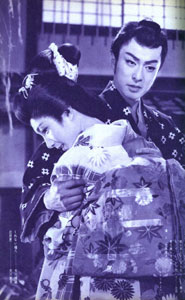 As rain pours down Gonpachi takes on five men at once, fairly easily fighting them off in spite of the lack of visibility in the dark night. He kills two of his attackers when unexpectedly the elderly sensei rushes forth to stop the needless fighting. As rain pours down Gonpachi takes on five men at once, fairly easily fighting them off in spite of the lack of visibility in the dark night. He kills two of his attackers when unexpectedly the elderly sensei rushes forth to stop the needless fighting.
Gonpachi cut him down by accident, then swiftly slipped away from the bridge to avoid further bloodshed. He had no idea who it was he killed.
Carried to his home, Munakata has no hope of recovery. Upon his last breath, he begs his daughter Hiroe (Keiko Okawa) to hold no grudge, for, "Gonpachi did not know it was me."
Jujima & his brother Ojima & the fencing instructor's daughter Hiroe, showing no respect for the old man's wishes, set out on the road of vengeance, knowing Gonpachi was headed for Kyoto.
Hiroe doesn't know what her enemy looks like, which makes it inevitable that she meets him under circumstances that allow her to become enamored of the beautiful young man, not realizing he's the very man she hopes to kill.
In Gonpachi's second big fight scene, he's pitted against six avengers. During this encounter he learns he accidentally killed the elder sword instructor of Himeji. This unhappy news depresses him considerably. He flees the fight, killing none of his attackers, whose actions he now finds entirely understandable.
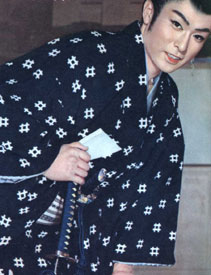 Meanwhile, Fujima & his older brother Ojima have a falling out, due to jealousy & their mutual love for Hiroe. She feels so to blame for coming between brothers that she slips away from them, taking her separate path, & again meets Gonpachi. Meanwhile, Fujima & his older brother Ojima have a falling out, due to jealousy & their mutual love for Hiroe. She feels so to blame for coming between brothers that she slips away from them, taking her separate path, & again meets Gonpachi.
This time he reveals his identity to her. He actually tries to be killed by her so she can fulfill her duty of kataki-uchi, which by the cultural norm is noble, justified vengeance. She, however, fails to take full advantage of her unexpected opportunity.
Gonpachi meets labor boss Hanakado Chobei, played by Utaemon Ichikawa, a superb character actor who when younger had been a great leading man, & continued to star in the "Bored Hatamoto" series through the '50s.
Chobei takes in Gonpachi, intending to help him. He wants to intercede in the students' collective desire for vengeance. Gonpachi, however, insists that he is willing to die, but he will only permit Hiroe to cut him down.
The geisha Koyu (Yumiko Hasegawa) is the drunken mistress of Sagaro, her wealthy patron. She falls in love with Gonpachi. Very interestingly, Koyu is a taiko drummer, which fact annoys her patron, as this is usually a man's instrument, & it gets her too much attention. The conflict leads to Gonpachi having to protect her during a parade in Kyoto.
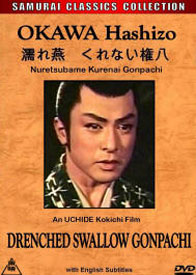 Chobei, at first impressed by Gonpachi, is soon expressing his disgust about the young swordsman's layabout easy life & his failure to pursue what he had claimed was his mission, death at the hand of the woman avenger. Chobei, at first impressed by Gonpachi, is soon expressing his disgust about the young swordsman's layabout easy life & his failure to pursue what he had claimed was his mission, death at the hand of the woman avenger.
But secretly Chobei's not disgusted; he prefers to pull strings furtively in his desire to save Gonpachi from death. He uses Koyu as bait to get Gonpachi interested in something other than death.
In time Hiroe & Gonpachi meet again. She is with a little retinue of her father's students, but she fails to announce his presence, torn as she is by love.
When Ojima finds out Hiroe has fallen under Gonpachi's easy spell, he's appalled that she would let personal feelings get in the way of kataki-uchi. She is so ashamed that she reconfirms that she can kill Gonpachi, even if she cannot take pleasure in it.
In the fourth swordplay scene, again by night but this time in a lumber yard, Gonpachi has been betrayed by jealous Koyu, who afterward of course regrets what she has done.
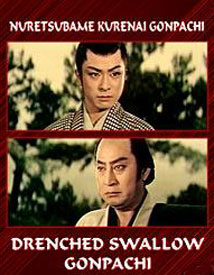 He now must fight in earnest for his life. Though it appears to be easy for him to kill one attacker after another, for once he cannot escape injury of his own. He now must fight in earnest for his life. Though it appears to be easy for him to kill one attacker after another, for once he cannot escape injury of his own.
He flees wounded to where Hiroe is staying, still hoping to die by no hand but hers. Frankly the mushy scene with Hiroe is not as moving as it was supposed to be. And Chobei's arrival to talk him out of dying is likewise only tepidly interesting. And most certainly "happy ever after" is the wrong ending for this tale.
For all that Drenched-Swallow Gonpachi is a family film bound to trump up a good outcome no matter how unlikely, it's even so more serious than many of Hashizo's family films. Certainly it's reliant on pat set pieces & standard tableaus, yet it's very appealing.
One oddball ingredient in Hashizo films is his endless supply of dandified kimonos, & Gonpachi is constantly finding obviously expensive costumes between scenes. In the "Wakasama Samurai" series he's secretly the Shogun's bastard son, as he is also in the Shingo Aoi series, so it's logical he might have an income for his ritzy tastes.
But Gonpachi is a masterless samurai without obvious means of support. Here again conventionality & expectation undermined realism. Hashizo was famous for his excessive costumes & even designed many of them himself. Fans liked it, & the filmmaking team aimed to please the masses.
copyright © by Paghat the Ratgirl
|

